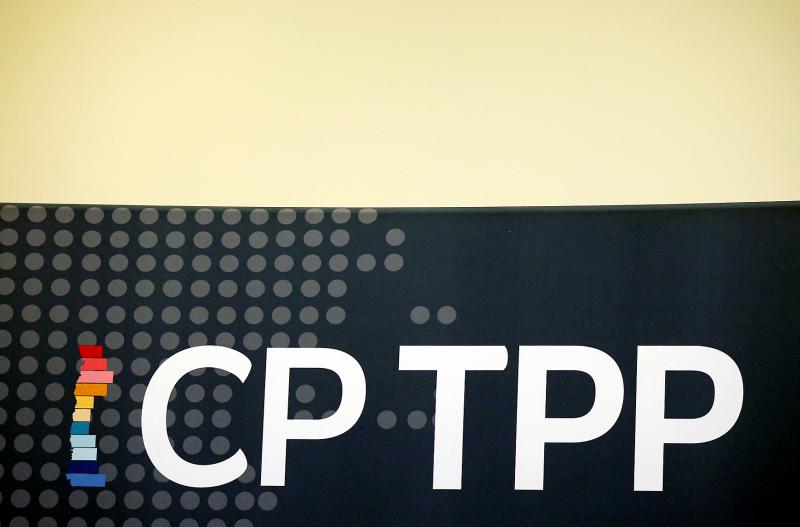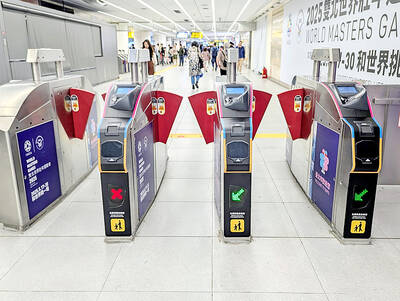Japan’s support is crucial to Taiwan’s bid to join the Comprehensive and Progressive Trans-Pacific Partnership (CPTPP), a Taiwanese international trade expert said yesterday, amid reports that Taiwan’s application is expected to be discussed by the bloc’s decisionmaking body on Thursday.
The CPTPP commission is reportedly set to hold an online meeting on Thursday to discuss membership applications from Taiwan, China and Ecuador.
Public attention is likely to focus on whether Taiwan’s application process would be stalled due to political factors, local media said.

Photo: Reuters
Taiwan in September last year applied to join the CPTPP, an 11-nation Asia-Pacific trading bloc that represents 495 million consumers and 13.5 percent of the global economy.
As Japan is the lead country in the CPTPP, its support of members consulting with Taiwan to facilitate its admission, prior to resolving political issues, would be in Taiwan’s favor, said Roy Chun Lee (李淳), senior deputy CEO of the Taiwan WTO & RTA Center at the Chung-Hua Institution for Economic Research.
Meanwhile, Taiwan should seek discussions on mutual trade concerns with CPTPP members, and demonstrate that it is prepared to join the trade bloc, Lee said.
Discussions in the next commission meeting are expected to focus on issues regarding the UK’s admission to the bloc, he added.
Despite reported expectations, it is unlikely that Taiwan, China and Ecuador’s applications would be discussed at Thursday’s online meeting, as they are not likely to be processed in time, Lee said.
CPTPP admission requires the unanimous consent of its members for negotiations to begin. The applicant country negotiate its market access and demonstrates how it would meet the benchmarks.
Taiwan is in the initial stage of access negotiations, and it must conduct bilateral consultations with at least eight CPTPP members, Lee said.
Tokyo is expected to support Taiwan’s bid given that Taipei is by the end of the month to lift its ban on most food imports from areas in Japan that had been implemented after the 2011 Fukushima nuclear disaster, he said.
If Japan voices support for Taiwan, the other countries in the CPTPP decisionmaking body are also likely to back its bilateral negotiations, Lee said.
However, some countries could decline to hold consultations with Taiwan to consider China’s interests, he said, adding that China using economic coercion against the main CPTPP members cannot be ruled out.
Minister Without Portfolio John Deng (鄧振中), who heads the Cabinet’s Office of Trade Negotiations, said that Taiwan cannot confirm when the CPTPP commission meeting would be held, as it is not a member of the bloc.
“What’s most important is that we be well prepared” for admission to the CPTPP, he said.

A magnitude 6.4 earthquake struck off the coast of Hualien County in eastern Taiwan at 7pm yesterday, the Central Weather Administration (CWA) said. The epicenter of the temblor was at sea, about 69.9km south of Hualien County Hall, at a depth of 30.9km, it said. There were no immediate reports of damage resulting from the quake. The earthquake’s intensity, which gauges the actual effect of a temblor, was highest in Taitung County’s Changbin Township (長濱), where it measured 5 on Taiwan’s seven-tier intensity scale. The quake also measured an intensity of 4 in Hualien, Nantou, Chiayi, Yunlin, Changhua and Miaoli counties, as well as

Credit departments of farmers’ and fishers’ associations blocked a total of more than NT$180 million (US$6.01 million) from being lost to scams last year, National Police Agency (NPA) data showed. The Agricultural Finance Agency (AFA) said last week that staff of farmers’ and fishers’ associations’ credit departments are required to implement fraud prevention measures when they serve clients at the counter. They would ask clients about personal financial management activities whenever they suspect there might be a fraud situation, and would immediately report the incident to local authorities, which would send police officers to the site to help, it said. NPA data showed

ENERGY RESILIENCE: Although Alaska is open for investments, Taiwan is sourcing its gas from the Middle East, and the sea routes carry risks, Ho Cheng-hui said US government officials’ high-profile reception of a Taiwanese representative at the Alaska Sustainable Energy Conference indicated the emergence of an Indo-Pacific energy resilience alliance, an academic said. Presidential Office Secretary-General Pan Men-an (潘孟安) attended the conference in Alaska on Thursday last week at the invitation of the US government. Pan visited oil and gas facilities with senior US officials, including US Secretary of the Interior Doug Burgum, US Secretary of Energy Chris Wright, Alaska Governor Mike Dunleavy and US Senator Daniel Sullivan. Pan attending the conference on behalf of President William Lai (賴清德) shows a significant elevation in diplomatic representation,

The Taipei MRT is to begin accepting mobile payment services in the fall, Taipei Rapid Transit Corp said on Saturday. When the company finishes the installation of new payment units at ticketing gates in October, MRT passengers can use credit cards, Apple Pay, Google Pay and Samsung Pay, the operator said. In addition, the MRT would also provide QR payment codes — which would be compatible with Line Pay, Jkopay, iPass Money, PXPay Plus, EasyWallet, iCash Pay, Taiwan Pay and Taishin Pay — to access the railway system. Currently, passengers can access the Taipei MRT by buying a single-journey token or using EasyCard,